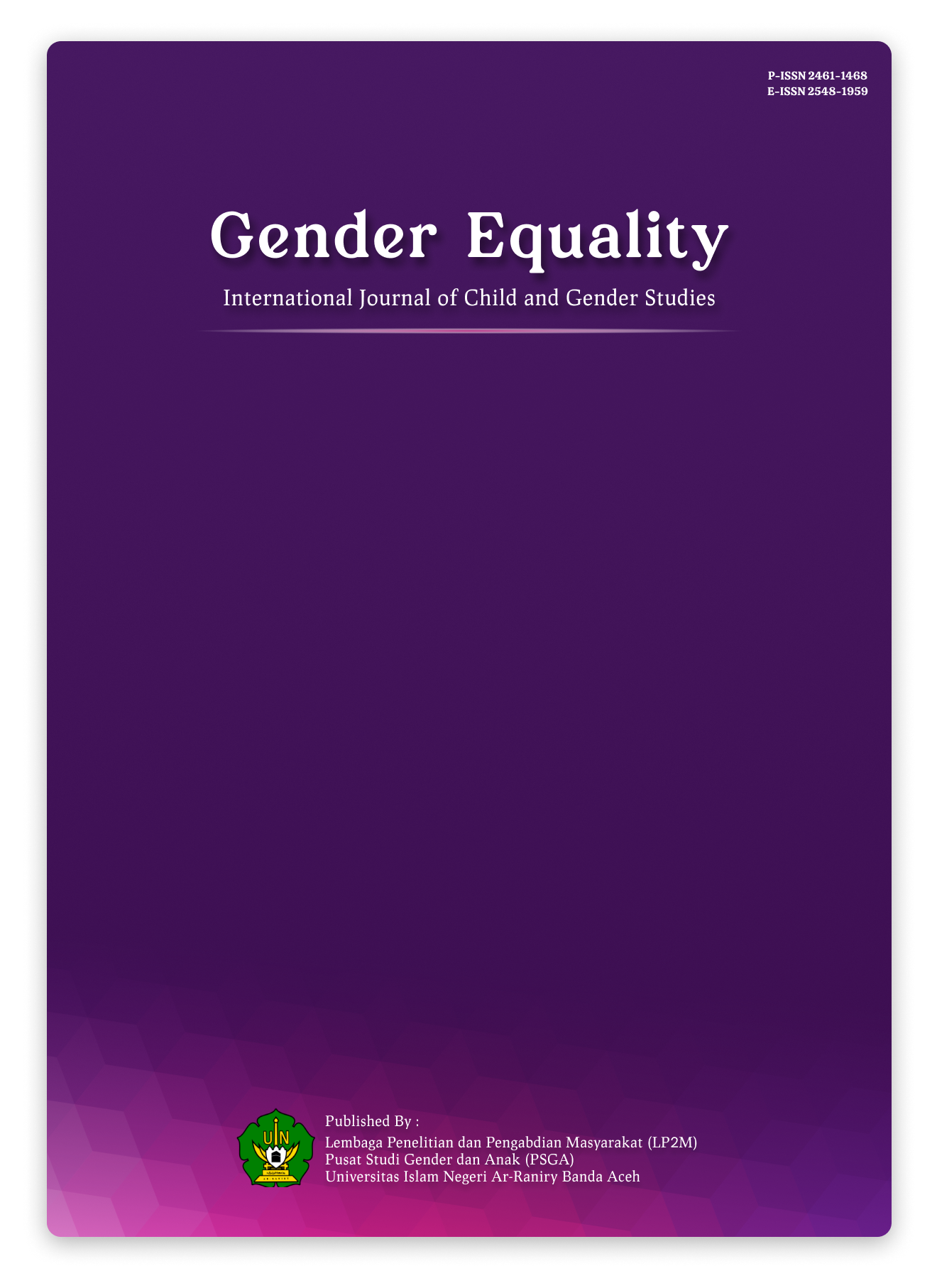Exploitation and objectification of women through Video Call Sex practice in radical feminism: The study of the phenomenon in working women
DOI:
https://doi.org/10.22373/equality.v11i1.28287Keywords:
Radical Feminism, Women Exploitation, Video Call SexAbstract
The exploitation and objectification of women are issues that develop across various aspects of life, including the digital realm. From a radical feminist perspective, the phenomenon of Video Call Sex arises due to the rapid advancement of digital technology, leading to increased exploitation of women. This practice commodifies women's bodies to fulfill men's sexual desires. This study aims to analyze the forms of exploitation and objectification experienced by women in Video Call Sex practices. A qualitative approach with a phenomenological perspective was used. Data collection techniques included interviews and participatory observations. The research subjects were women with direct experience in Video Call Sex who were willing to openly share their personal experiences. The study involved three informants, and data collection continued until no new information was found. The study’s findings reveal that: (1) Women are reduced to sexual objects controlled by men, either as clients or as request regulators. (2) There is a power imbalance between men and women, as women are in a vulnerable position in responding to client demands. These findings indicate that women in Video Call Sex practices face not only economic exploitation but also structural oppression that sustains gender inequality. The novelty of this research lies in its in-depth analysis of how digital technology reinforces the exploitation of women within a radical feminist framework and how this practice contributes to the expanding patriarchal system in the digital era.
References
Abeline, N., Erviantono, T., & Puspitasari Ni Waya Radita Novi. (2024). Eksploitasi tubuh perempuan dalam perfilman horor indonesia studi politik tubuh terhadap film Suster Keramas. Jurnal Ilmiah Wahana Pendidikan, 10(2), 668–684. https://doi.org/10.5281/zenodo.10494810
Andayani, T., Achmad, R., & Flambonita, S. (2022). Perlindungan hukum terhadap anak korban eksploitasi seksual. Lex LATA, 3(1), 104-121. https://doi.org/10.28946/lexl.v3i1.868
Astuti, I. W., Juliana, S. A., & Pratama, A. A. (2024). Perempuan sebagai objek tatapan dalam promosi gadget di akun TikTok @planetgadget.store. Jurnal Audiens, 4(4), 612–620. https://doi.org/10.18196/jas.v4i4.276
Ayu, I. S., & Erianjoni, E. (2023). Video call sex (vcs) berbayar pilihan remaja kota Padang dalam pelampiasan hasrat. Jurnal Perspektif, 6(1), 9–17. https://doi.org/10.24036/perspektif.v6i1.662
Erviantono, T., & Noak, P. A. (2018). Eksploitasi tubuh perempuan dalam ruang media sosial TikTok (Studi kasus akun TikTok good ponsel).
Fadliati, S., & Sukiati, S. (2023). Eksploitasi pekerja perempuan melalui modus staycation dalam perpanjangan kontrak kerja. Al-Adalah: Jurnal Hukum Dan Politik Islam, 8(2), 235–254. https://doi.org/10.30863/ajmpi.v8i2.5476
Febrilly, V., & Siscawati, M. (2023). Eksploitasi perempuan buruh oleh industri garmen : fenomena global tren pakaian mode cepat (Fast fashion). Jurnal Vidya Wertta, 6(1), 34–49.
Ida Bagus Gede Subawa, Ni Putu Sekarwangi Saraswati, A.A. KT Sudiana, & Dewa Gede Edi Praditha. (2021). Pertanggung jawaban pidana pelaku dan korban sekstorsi kegiatan video call sex (vcs) ditinjau dari perspektif hukum positif Indonesia. Jurnal Yusthima, 1(01), 23–36. https://doi.org/10.36733/yusthima.v1i01.2980
Joko Sampurno, R. D. (2024). The myth of equality: Sexual harassment behind a woman’s desk. Gender Equality: International Journal of Child and Gender Studies, 10(1), 80. https://doi.org/10.22373/equality.v10i1.22302
Journal, I. (2017). Gender equality. Nursing Management, 23(9), 12. https://doi.org/10.7748/nm.23.9.12.s14
Juditha, MA, C. (2022). Kekerasan berbasis gender online di masa pandemi: Eksploitasi seks daring pada remaja di Kota Manado. Jurnal Pekommas, 7(1), 1–12. https://doi.org/10.56873/jpkm.v7i1.4687
Juditha, C. (2021). Prostitusi daring: Tren industri jasa seks komersial di media sosial. Pekommas, 6(1), 51–63. https://doi.org/10.30818/jpkm.2021.2060106
Lintang, S. D., Melinda Rahmah, A., & Safaat, F. (2024). Eksploitasi seksualitas perempuan dalam iklan kondom sutra gerigi–bikin nagih. Jurnal Audiens, 5(1), 40–50. https://doi.org/10.18196/jas.v5i1.290
Mudjiyanto, B., Lusianawati, H., & Azizah, N. (2024). Media sosial dan prostitusi online (Studi penggunaan media sosial sebagai sarana amplifikasi prostitusi online). Jurnal The Source, 6(1), 20–36.
Nanil, S. M. H., Kadir, H., & Far Lantowa, J. ’. (2022). Eksploitasi dan objektivitas perempuan dalam novel hilda karya Muyassarotul Hafidzoh (Sebuah kajian feminisme radikal). Jambura Journal of Linguistics and Literature, 3(1), 33–48. https://ejurnal.ung.ac.id/index.php/jjll
Purwanti, T. (2020). Kuasa tubuh dan perlawanan: anti politisasi dan komodifikasi tubuh perempuan dalam ruang virtual. Umbara, 5(2), 141. https://doi.org/10.24198/umbara.v5i2.29962
Rahmaini, I. S., & A Zahid, A. Z. (2020). Komodifikasi prostitusi online sebagai kritik atas globalisasi. Asketik, 4(1), 34–47. https://doi.org/10.30762/ask.v4i1.2120
Ronaldi, R., & Kartika, Y. (2024). Tinjauan viktimologi terhadap korban tindak pidana pemerasan dengan modus video call sex (vcs) di Kota Palangka Raya. MORALITY: Jurnal Ilmu Hukum, 10(1), 156-167.
Sulastri, A., & Rochmansyah, B. N. (2024). Eksploitasi perempuan pada puisi bersatulah pelacur-pelacur kota Jakarta karya WS Rendra dengan pendekatan Feminisme Marxis. Literature Research Journal E-ISSN, 2(1), 96–109. https://doi.org/10.51817/lrj.v2i1.793
Wahdiyati, D., & Dhaifina, G. (2022). Muatan pornografi, pornoaksi, dan eksploitasi perempuan dalam lagu dangdut. Calathu: Jurnal Ilmu Komunikasi, 4(1), 9–30. https://doi.org/10.37715/calathu.v4i1.2709
Yudi, D. T. N., & Halwati, U. (2024). Komodifikasi tubuh perempuan dalam iklan axe: representasi dalam dunia iklan. Global: Jurnal Ilmiah Multidisiplin, 1(1), 1–10. https://doi.org/10.37985/dm211w67
Downloads
Additional Files
Published
Issue
Section
License
GENDER EQUALITY: International Journal of Child and Gender Studies allows the author(s) to hold the copyright and to retain the publishing rights without restrictions. Authors who publish with this journal agree to the following terms:
- Authors retain copyright and grant the journal right of first publication with the work simultaneously licensed under a Creative Commons Attribution License that allows others to share the work with an acknowledgment of the work's authorship and initial publication in this journal.
- Authors are able to enter into separate, additional contractual arrangements for the non-exclusive distribution of the journal's published version of the work (e.g., post it to an institutional repository or publish it in a book), with an acknowledgment of its initial publication in this journal.
- Authors are permitted and encouraged to post their work online (e.g., in institutional repositories or on their website) prior to and during the submission process, as it can lead to productive exchanges, as well as earlier and greater citation of published work.



